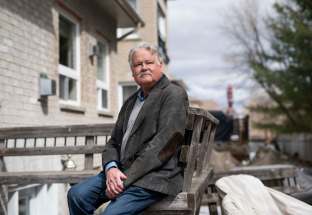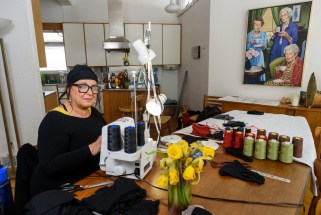Importance of saying goodbye
Read this article for free:
or
Already have an account? Log in here »
To continue reading, please subscribe:
Monthly Digital Subscription
$19 $0 for the first 4 weeks*
- Enjoy unlimited reading on winnipegfreepress.com
- Read the E-Edition, our digital replica newspaper
- Access News Break, our award-winning app
- Play interactive puzzles
*No charge for 4 weeks then billed as $19 every four weeks (new subscribers and qualified returning subscribers only). Cancel anytime.
Read unlimited articles for free today:
or
Already have an account? Log in here »
Hey there, time traveller!
This article was published 02/04/2020 (1478 days ago), so information in it may no longer be current.
In times such as this, semi-retired Winnipeg pastor John Braun thinks back to the death of his father in 2008. There was an influenza outbreak, and seniors care facilities had shut their doors to visitors.
When his father died, it was without any of his loved ones around him.
“We had feelings of guilt for not being there, and my mother had feelings of guilt for not being there,” Braun told the Free Press.
With current restrictions on visitors to hospitals and care homes, more people will be dying alone — and more families will be dealing with the added grief of never having had that chance to say goodbye. Some of those deaths will be from illnesses and ailments unrelated to COVID-19, but so, too, will there be many more deaths from the novel coronavirus.
On Friday, Ontario released estimates that between 3,000 and 15,000 people will die from COVID-19 in that province alone. Manitoba has yet to release any projected figures.
Stories not only from New York City and Italy, but now from Southern Ontario and Alberta, of loved ones rushed into hospital isolation with little to no warning, never to be seen again alive, become a possibility Manitobans must face.
“The impact then on the families, they have to think about how their mother or their dad died in a hospital or nursing home alone — that’s going to be with them for a long time,” said Verena Menec, vice-president of the Canadian Association on Gerontology and professor of community health science at the University of Manitoba.
To Menec, this could be one of the saddest parts of the whole situation. While all deaths may be difficult, research has proven some are more easily accepted; Menec suspects the pandemic will be rife with more deaths in negative circumstances, “That will stay with (friends and relatives) for a long time.”
In his time as a pastor at Charleswood Mennonite Church and Bethel Mennonite Church, Braun has sat at the bedside of people as they died. He knows those moments are priceless to friends and family members. But from his experience with his own father, Braun said the guilt of missing it need not be all-consuming.
After his father had died, a nurse — new to the job and 20 years old — called his mother and told her that her husband hadn’t been alone in his final moments; the nurse had been with him, held his hand and prayed. It’s a story that meant the world to Braun and his family.
Braun said he knows, having spent a lot of time in health-care facilities, the staff spend the time whenever they can.
“We are all each other’s families more than ever now,” he said.
Support workers in seniors care facilities are also taking the time to help residents with ways to connect with friends and family before things become dire.
Connie Newman is the executive director of the Manitoba Association of Seniors Centres, but also has loved ones living in long-term care facilities. She said a close friend has started video chatting her, after being taught how to by a staff member.
“That, to me, is power,” Newman said. “You may not be able to touch, but when you can see, it’s the next step up from the phone call.”
She fears Manitobans have not yet come to terms with how many lives, especially in the aging population, could be lost in the coming months.
Braun hopes people with loved ones living away from them use this time to reconnect by phone or whatever technology is useful. And for those who are living in close quarters, don’t allow for relationships to fray.
“I think we need to keep that in the back of our minds: there are higher tensions now, and we need to cut each other a little slack,” Braun said.
sarah.lawrynuik@freepress.mb.ca
Twitter: @SarahLawrynuik
Connie Newman, executive director of the Manitoba Association of Seniors Centres, encourages anyone struggling with mental health-related concerns linked to the novel coronavirus to reach out to Seniors Centre Without Walls (toll free 1-888-333-3121). The new program uses phone activities to connect people amid the islolation of the pandemic.








